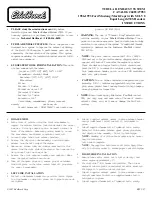
2. Safety 15
Driving arround corners
Due to its height, a van begins to sway more quickly than an
automobile.
The following applies for driving arround corners
• Never drive too quickly into a corner!
• When turning off the road, always pull out a little more to
ensure a larger curve radius. Please note that, depending
on the model, the rear end of the van may swing out.
Braking
A van has a different brake response than that of a car. For this
reason, inexperienced drivers in particular should carry out
several test brake manoeuvres in a suitable location before
driving on the road. The braking distance of the van is longer
than that of a car. Furthermore, it is strongly influenced by how
heavily the van has been loaded.
The following applies for braking
• Not the longer braking distance, especially on wet roads.
• When driving downhill, select a gear that is not higher than
when driving uphill.
Driving economically
The engine of your van has not been designed to drive con-
stantly under a full load.
The following applies when driving
• Do not keep your foot down on the accelerator!
• The final 20 km/h before reaching top speed require up to
50 % more fuel!
•
Never
accelerate if the van starts to swing.
• Adjust your speed to road and traffic conditions.
• Long descents with a slight gradient can become dangerous.
Adjust your speed from the very beginning to allow you to
speed up if necessary without endangering other automobiles.
• As a general rule, never drive faster downhill than uphill.
• The van may be caught up in a slipstream when overtaking or
being overtaken by lorries with trailers or buses. This effect
is counteracted by lightly counter-steering.
•
Use foresight while driving; take regular breaks on longer
drives.
Should there be any defects or malfunctions in the driving
performance of the van, please notify roadside assistance
and have any maintenance and repair work carried out by
an authorised specialist.
















































